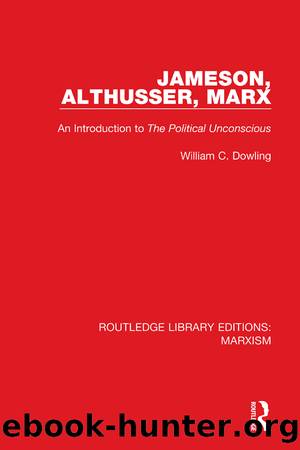Jameson, Althusser, Marx (RLE Marxism) by William C. Dowling;

Author:William C. Dowling;
Language: eng
Format: epub
ISBN: 9781000156065
Publisher: Taylor & Francis (Unlimited)
Published: 2015-06-15T00:00:00+00:00
5
Narrative and Interpretation
A glance at the subtitle of The Political Unconscious, Narrative as a Socially Symbolic Act, is enough to suggest that narrative will be at the heart of Jamesonâs enterprise, but no title or subtitle can suggest why it should be so crucial to him. An educated guess, perhaps, would be that his primary interest as a Marxist lies in the novel, the one great literary form that grew up together with capitalism and that permits itself to be read, as in Lukacsâs criticism, as an allegory of class relations within the capitalist order. To a degree this is so. Though he begins his actual treatment of literature with a chapter on romance that includes brilliant observations on medieval versions of the form, Jamesonâs real interests lie in the nineteenth-century novel and its modernist successors, in Stendal and Balzac and Gissing and Conrad and beyond. So his interest in narrative is partly due to the novelâs being a narrative form.
On a deeper level, though, Jamesonâs work assumes as its background a good deal of serious thinking that has gone on in recent years about narrative, and narrative not just as it is found in literature but outside it as well. For one of the most suggestive insights of the newer literary theory is that narrative or âstoryâ is not specifically a literary form: it is found, to be sure, in novels and epic poems, but it is also found in movies and comic strips and ballets and puppet shows and anecdotes told at cocktail parties, and to see that it has in all these instances certain invariant structural features is to leave behind the confines of literary criticism for a wider field of inquiry. The narrative form of nineteenth-century novels may thus be taken as evidence of their possessing a more universal dimension.
As we have seen, Marxism in general and Jameson in particular have a deep distrust of anything pretending to timeless or universal significance, and this may well be why Jameson never pauses to reflect on narrative as such, but in fact many of his insights depend on the notion that narrative, once floated loose from its instantiation in novels or myths or epic poems, is really not so much a literary form or structure as an epistemological category. Like the Kantian concepts of space and time, that is, narrative may be taken not as a feature of our experience but as one of the abstract or âemptyâ coordinates within which we come to know the world, a contentless form that our perception imposes on the raw flux of reality, giving it, even as we perceive, the comprehensible order we call experience. This is not to make the conventional claim that we make up stories about the world to understand it, but the much more radical claim that the world comes to us in the shape of stories.
As one can often get students to see how the Kantian categories âworkâ by asking them to try to imagine the
Download
This site does not store any files on its server. We only index and link to content provided by other sites. Please contact the content providers to delete copyright contents if any and email us, we'll remove relevant links or contents immediately.
| Books & Reading | Comparative Literature |
| Criticism & Theory | Genres & Styles |
| Movements & Periods | Reference |
| Regional & Cultural | Women Authors |
4 3 2 1: A Novel by Paul Auster(11792)
The handmaid's tale by Margaret Atwood(7450)
Giovanni's Room by James Baldwin(6810)
Asking the Right Questions: A Guide to Critical Thinking by M. Neil Browne & Stuart M. Keeley(5357)
Big Magic: Creative Living Beyond Fear by Elizabeth Gilbert(5353)
Ego Is the Enemy by Ryan Holiday(4958)
On Writing A Memoir of the Craft by Stephen King(4664)
The Body: A Guide for Occupants by Bill Bryson(4584)
Ken Follett - World without end by Ken Follett(4444)
Bluets by Maggie Nelson(4261)
Adulting by Kelly Williams Brown(4235)
Eat That Frog! by Brian Tracy(4149)
Guilty Pleasures by Laurell K Hamilton(4118)
White Noise - A Novel by Don DeLillo(3829)
The Poetry of Pablo Neruda by Pablo Neruda(3816)
Fingerprints of the Gods by Graham Hancock(3738)
Alive: The Story of the Andes Survivors by Piers Paul Read(3731)
The Book of Joy by Dalai Lama(3698)
The Bookshop by Penelope Fitzgerald(3619)
